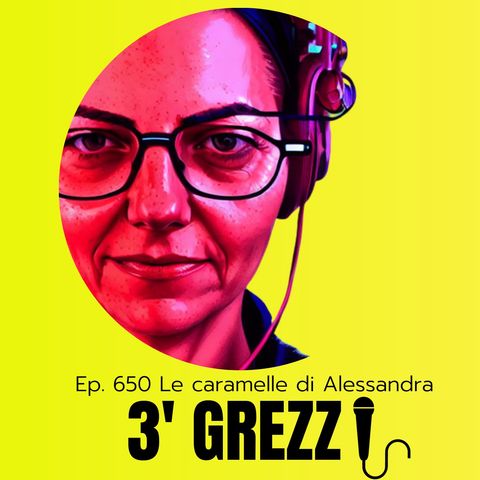3' grezzi Ep. 650 Le caramelle di Alessandra

Scarica e ascolta ovunque
Scarica i tuoi episodi preferiti e goditi l'ascolto, ovunque tu sia! Iscriviti o accedi ora per ascoltare offline.
3' grezzi Ep. 650 Le caramelle di Alessandra
Descrizione
🎙️ Riflessioni sulla Doppia Terminazione e l'Inclusione! 🤔 Ispirata dalla newsletter di Alessandra Arpi "Caramelle da una sconosciuta" (trovate il link in fondo alla pagina). TRASCRIZIONE [ENG translation & link...
mostra di piùTRASCRIZIONE [ENG translation & link below]
Stamattina ho letto un pensiero che mi ha fatto riflettere e voglio condividerlo con voi. Prima di tutto devo dire che l'ho letto nella newsletter di Alessandra Arpi che si chiama "Caramelle da una sconosciuta", già il titolo vi fa capire che è una newsletter che amo e ogni volta che arriva nella mia cassetta delle lettere virtuale me la leggo a colazione e spesso ci sono delle cose che condivido e che mi portano a riflettere, così come stamattina.
Di cosa si tratta? Si tratta dell'uso dei pronomi. Ora, in inglese quei furbetti non hanno questi problemi, basta che usino 'they' che il plurale asessuato e va bene per tutti. Noi come sapete molto bene in Italia invece abbiamo il problema del fatto che tutte le parole hanno un loro genere e che di conseguenza devono essere declinate in un certo modo.
Cos'era il commento che mi ha fatto riflettere e che condivido? Il fatto che quando si entra in un'assemblea pubblica o in un incontro e la persona che parla inizia dicendo "benvenuti e benvenute" o "tutti e tutte", e un po' si tira un sospiro di sollievo perché quando una persona usa la doppia terminazione maschile e femminile, quindi quando rifiuta di usare il maschile per includere anche i non maschi, sta lanciando un segnale, non è che ci sia la garanzia di venire rispettate e che ci sia pluralità, no. Poi magari una persona dice "tutti e tutte" mette l'asterisco eccetera però poi è una persona che si comporta molto male, magari è un maschilista, però il fatto che si sia fatta attenzione e si faccia, si mostri come, ci ho pensato mi costa più parole, rende il discorso più lungo più farraginoso (farraginoso? com'è che si dice?), lo uso lo stesso perché voglio, come se mettessi fuori una bandiera per dire ecco, mi sono posto il problema, non l'ho risolto, non lo risolverò, magari sono una persona che tratta male gli altri, però mi sono messo il problema di non includere tutte le persone presenti in quel 'tutti-maschile-universale" perché ci sono anche le tutte e ci sono anche delle cose che non sono né tutti né tutte, delle persone che non si identificano né nel genere maschile e quello femminile, ma questo è un altro discorso, troppo difficile per la lingua italiana.
Però devo dire che brava Alessandra Arpi, "Caramelle da una sconosciuta", mi sei piaciuta, vi metto il link nelle note del programma così magari vi iscrivete anche voi.
TRANSLATION
I read something this morning that got me thinking and I want to share it with you. First of all, I have to say that I read it in Alessandra Arpi's newsletter which is called "Candy from a lady you don't know" already the title lets you know that it is a newsletter that I love and every time it arrives in my virtual mailbox I read it over breakfast and often there are things in it that I share and that lead me to reflect, as well as this morning.
What is it all about? It is about the use of pronouns. Now, in English those smart guys don't have these problems, just use 'they' asexual plural and it's fine for everyone. We as you know very well in Italy on the other hand have the problem that all words have their own gender and consequently, they have to be declined in a certain way.
What was the comment that got me thinking and that I agree with? The fact that when you go into a public assembly or a meeting and the person speaking starts by saying "welcome female and and welcome male" or "all female and all male," then a little bit you breathe a sigh of relief because when a person uses the double masculine and feminine termination, so when they refuse to use the masculine to include non-males, they are sending a signal, it's not that there is a guarantee that they will be respectful and that there will be plurality, no. Then maybe a person puts the asterisk etc. however then they are a person who behaves very badly, maybe they are a macho, however the fact that you have been paying attention and you do, you show that you thought about it, it costs me more words, makes the speech longer more awkward, but still I use it because I want to, as if to put out a flag to say here, I put out the problem, I haven't solved it, I'm not going to solve it, maybe I'm a person who treats others badly, however I put out the problem of not including all the people present in that 'all-masculine-universal' because there are also there people that do not identify with male or female, people who identify neither in the male gender nor the female gender, but that's another matter, too difficult for the Italian language .
I have to say though, good job Alessandra Arpi, "Candy from a lady you don't know" I liked it, I'll put the link in the program notes so maybe you too can sign up.
LINK: Iscrivetevi anche voi alla newsletter di Alessandra Arpi: Caramelle da una sconosciuta
Informazioni
| Autore | M. Cristina Marras |
| Organizzazione | M. Cristina Marras |
| Sito | - |
| Tag |
Copyright 2024 - Spreaker Inc. an iHeartMedia Company

Commenti